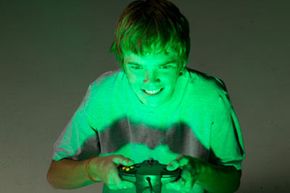Obsessively checking e-mail. Playing online games for 12 hours or more at a time. Placing more value on chat-room friends than real friends. Neglecting family, work and even personal health and hygiene. These are all symptoms of a new form of addiction that has surfaced only in recent years: computer addiction. In this article, we'll learn about computer addiction, why it's a problem -- and why some doctors disagree about whether it exists at all.
Creating a single definition for computer addiction is difficult because the term actually covers a wide spectrum of addictions. Few people are literally addicted to a computer as a physical object. They become addicted to activities performed on a computer, like instant messaging, viewing Internet pornography, playing video games, checking e-mail and reading news articles. These activities are collectively referred to as Computer Mediated Communication (CMC). Computer addiction focused on Internet use is often called Internet Addiction Disorder (IAD).
Advertisement
The various types of computer addicts have different reasons for their habits. Obsessive chat room use or e-mailing might fill a void of loneliness, while excessive viewing of pornography might stem from relationship problems or childhood abuse. The matter is further complicated by the fact that a computer is a useful tool. It's not like heroin, for example -- there are many legitimate reasons why someone might spend hours using a computer.
Even if someone uses a computer extensively for purely recreational purposes, that doesn't necessarily represent a real addiction any more than someone who spends hours working on a model train set, making quilts or gardening is "addicted" to those activities. Even the agreed-upon definition of addiction itself has evolved over the decades and remains a matter of debate in the medical community. In fact, the American Medical Association and the American Psychiatric Association do not currently consider computer addiction a valid diagnosis, a controversy we'll discuss later.
As a result of all these complications, any single definition of computer addiction is necessarily broad and a little vague. If the computer use is so pervasive that it interferes with other life activities, and if the user seems unable to stop using the computer to excess despite negative consequences, the problem might be a computer addiction.



